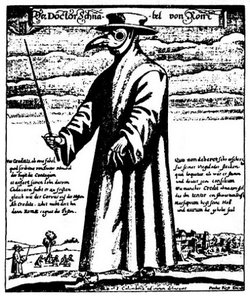The Bubonic Plague wiped put a giant swath of the affected populations, it was truly an Old Testament wrath-of-God phenomenon - but it also led to a wave of agricultural innovation and the creation of a middle class (How The Bubonic Plague Made Europe Great).
It also did what folklore says about things that don't kill you - it made us a little stronger.
As one of the most devastating epidemics in human history, the medieval Bubonic Plague, also known as the Black Death (c. 1347-1351) killed tens of millions of Europeans. Previous studies have shown that the disease targeted elderly adults and sick or stressed people but less is known about any substantial changes in the population, like overall health and mortality, before and after its occurrence.

Link: How The Bubonic Plague Made Europe Great
Following the epidemic, standards of living — particularly diet — improved, and a new paper argues that the deaths of frail people during the Black Death, combined with consequent rising standards of living, may have resulted in a healthier post-epidemic population in London. Most available data is in historical documentation (e.g., tax records and postmortem analysis)and the author also sampled nearly 600 skeletons from several pre- and post-Black Death London cemeteries and then analyzed their age and modeled age estimates, mortality hazards, and birth rate data for these samples.
Post-Black Death samples had a higher proportion of older adults, suggesting that survival may have improved following the epidemic. Additionally, results of hazards analysis indicate that overall, mortality risks were lower in the post-Black Death population than before the epidemic.

Age-at-death distributions for the pre- and post-Black Death samples. Credit:doi:10.1371/journal.pone.0096513
Together, these results may indicate enhanced survival and decreased mortality after the Black Death, and by inference, improved health in some age groups in the post-epidemic population. Although other factors could have influenced these differences, like the migration of people to London after the plague, Dr. DeWitte suggests that this study highlights the power that infectious diseases may have in shaping population-wide patterns of health and demography over both the short- and long-term.
Study author Dr. Sharon DeWitte said, "This study suggests that even in the face of major threats to health, such as repeated plague outbreaks, several generations of people who lived after the Black Death were healthier in general than people who lived before the epidemic."
Survival of the epidemiologically fittest? We can keep a lot more people alive today than ever before in history? Are we less fit if an unforeseen plague occurs because of that?





Comments